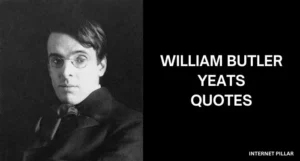John Knox became a priest and later a Protestant after being influenced by preacher George Wishart.
Following Wishart’s martyrdom and a series of conflicts Knox preached at St Andrews Castle before becoming a galley slave in France for 19 months.
After his release he preached in England and across Europe avoiding persecution.
Knox returned to Scotland where his sermons sparked the Protestant Reformation.
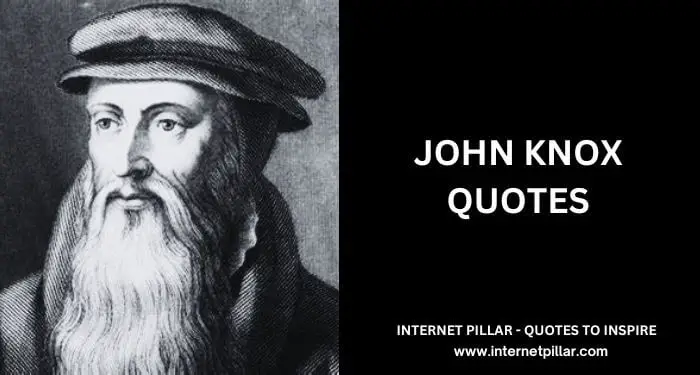
He married twice and had five children. Knox died in 1572 in Edinburgh.
Below you will find the most famous quotes by John Knox.
Best John Knox Quotes
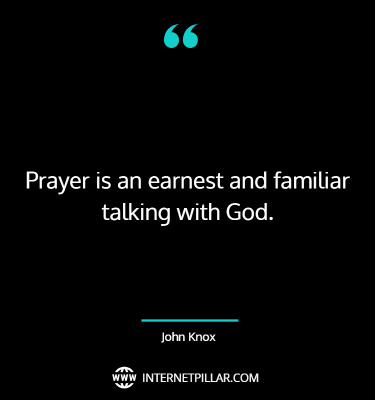
Prayer is an earnest and familiar talking with God. ~ John Knox.

A man with God is always in the majority. ~ John Knox.

I have never once feared the devil, but I tremble every time I enter the pulpit. ~ John Knox.

Here lies one who neither flattered nor feared any flesh. ~ John Knox.

You cannot antagonize and influence at the same time. ~ John Knox.

Live in Christ, die in Christ, and the flesh need not fear death. ~ John Knox.

In youth, in middle age, and now after many battles, I find nothing in me but corruption. ~ John Knox.

Here lies one who feared God so much that he never feared the face of any man. ~ John Knox.

As the world is weary of me so am I of it. ~ John Knox.
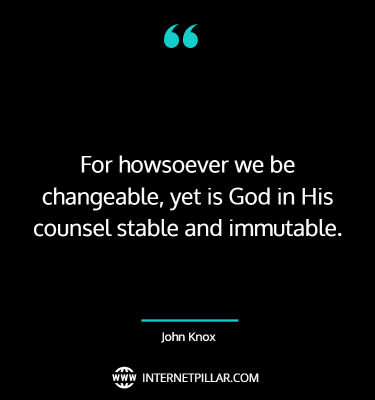
For howsoever we be changeable, yet is God in His counsel stable and immutable. ~ John Knox.

No man is so regenerate, but that continually he has need of the means which Christ Jesus has appointed to be used in his kirk. ~ John Knox.

Lord, give me Scotland or I die! ~ John Knox.
Top John Knox Quotes
The man who stands with God is always in the majority. ~ John Knox.
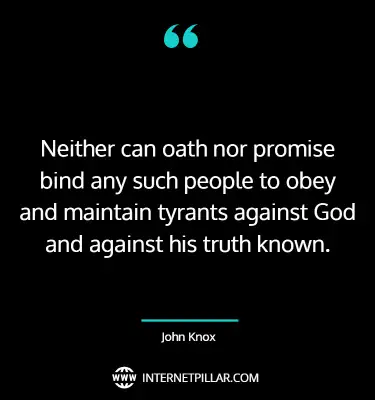
Neither can oath nor promise bind any such people to obey and maintain tyrants against God and against his truth known. ~ John Knox.
The Scriptures of God are my only foundation and substance in all matters of weight and importance. ~ John Knox.

O Lord Eternal, move and govern my tongue to speak the truth. ~ John Knox.
The testimony of scripture is so plain that to add anything were superfluous, were it not that the world is almost now come to that blindness, that whatsoever pleases not the princes and the multitude, the same is rejected as doctrine newly forged, and is condemned for heresy. ~ John Knox.

I cannot praise the common superfluity which women now use in their apparel. ~ John Knox.
Let a thing here be noted, that the prophet of God sometimes may teach treason against kings, and yet neither he nor such as obey the word, spoken in the Lord’s name by him, offend God. ~ John Knox.

I sought neither preeminence, glory, nor riches; my honor was that Jesus Christ should reign. ~ John Knox.
But hereof be assured, that all is not lawful nor just that is statute by civil laws; neither yet is everything sin before God, which ungodly persons allege to be treason. ~ John Knox.
Famous John Knox Quotes
It is not birth only, nor propinquity of blood, that makes a king lawfully to reign above a people professing Christ Jesus and his eternal verity; but in his election must the ordinance, which God has established in the election of inferior judges, be observed. ~ John Knox.

None have I corrupted, none have I defrauded; merchandise have I not made. ~ John Knox.
All that the Lord thy God commands thee to do, that do thou to the Lord thy God: add nothing to it, diminish nothing from it.′ By this rule, think I, the Kirk of Christ will measure God’s religion, and not by that which seems good in their own eyes. ~ John Knox.
I will keep the ground that God has given me and perhaps in his grace, he will ignite me again. But ignite me or not, in his grace, in his power, I will hold the ground. ~ John Knox.

Let no day slip over without some comfort received of the Word of God. ~ John Knox.
No one else holds or has held the place in the heart of the world which Jesus holds. Other gods have been as devoutly worshipped; no other man has been so devoutly loved. ~ John Knox.
Neither yet can you be able to prove, that we either by word or writing have affirmed, that the principal end of any man’s creation was perpetual pain. ~ John Knox.

When I think of those who have influenced my life the most, I think not of the great but of the good. ~ John Knox.
Popular John Knox Quotes
Considering myself called of my God to instruct the ignorant, comfort the sorrowful, confirm the weak, and rebuke the proud; by tongue and lively voice in these corrupt days rather than to compose books for the age to come, seeing that so much is written, and yet so little well observed, I decree to contain myself within the bounds of that vocation whereunto I found myself especially called. ~ John Knox.
To promote a woman to bear rule, superiority, dominion, or empire above any realm, nation, or city, is repugnant to nature; contumely to God, a thing most contrary to his revealed will and approved ordinance; and finally, it is the subversion of good order, of all equity and justice. ~ John Knox.
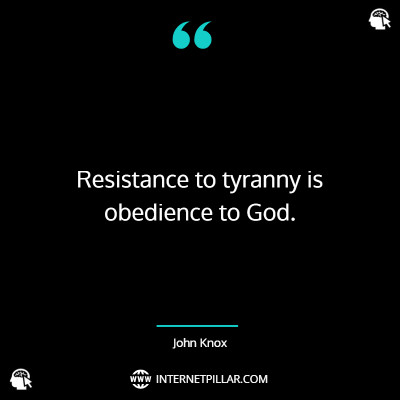
Resistance to tyranny is obedience to God. ~ John Knox.
Those who have arrived at any very eminent degree of excellence in the practice of an art or profession have commonly been actuated by a species of enthusiasm in their pursuit of it. They have kept one object in view amidst all the vicissitudes of time and torture. ~ John Knox.
I see the battle shall be great for Satan rageth even to the uttermost and I am come, (praise my God) even in the brunt of the battle. ~ John Knox.
If you cannot see just causes why God should make that thing very good which after should become extremely evil, accuse your own blindness; and desire of God to repress in you that presumption and pride which against the Eternal Son of God you have conceived. ~ John Knox.
Un homme avec Dieu est toujours dans la majorite. One man with God is always a majority. ~ John Knox.
So these were the 37 top John Knox quotes and sayings.
If you like these quotes and sayings, then you can also read my other posts on Austin Phelps quotes and Duane Chapman quotes.
Short Biography of John Knox
John Knox, born around 1514 in Haddington, Scotland, became a key figure in the Scottish Reformation and founded the Presbyterian Church of Scotland.
Initially educated at St Andrews and serving as a notary-priest, Knox was influenced by reformers like George Wishart.
| Full Name | John Knox |
| Born | c. 1514, Giffordgate, Haddington, Scotland |
| Died | 24 November 1572 (aged 58 or 59), Edinburgh, Scotland |
| Alma Mater | University of St. Andrews |
| Occupations | Pastor, Author, Reformer |
| Spouses | Margery Bowes (died 1560), Margaret Stewart (m. 1564) |
| Children | 5 |
| Tradition or Movement | Presbyterianism |
His involvement in reformist movements led to his imprisonment by French forces and subsequent exile to England, where he contributed to the Church of England under King Edward VI.
Forced to leave England upon Mary I’s Catholic restoration, Knox moved to Geneva, meeting John Calvin and deepening his Reformed theology understanding.
Returning to Scotland, he spearheaded the Protestant Reformation alongside the nobility, challenging Catholic practices and contributing significantly to the new Reformed Church.
Despite conflicts, including with Mary, Queen of Scots, Knox remained a pivotal religious leader until his death in 1572.
Quick Facts about John Knox
- John Knox was a Scottish minister and leader of the Reformation in Scotland.
- He founded the Presbyterian Church of Scotland.
- Knox was born in Giffordgate, Haddington, East Lothian.
- He studied at the University of St Andrews and worked as a notary-priest.
- Influenced by George Wishart, Knox joined the Scottish Church reform movement.
- He was taken prisoner by French forces in 1547 and exiled to England upon release in 1549.
- In England, Knox served as a royal chaplain to King Edward VI.
- He contributed to the reform of the Book of Common Prayer.
- Knox married Margery Bowes while in England.
- Forced to leave England when Mary I restored Catholicism, he moved to Geneva and met John Calvin.
- He created a new order of service for the Reformed Church in Scotland.
- Knox returned to Scotland and led the Protestant Reformation there.
- He helped write the new confession of faith for the Reformed Church.
- Knox admonished Mary, Queen of Scots, for supporting Catholic practices.
- He openly called for the execution of Mary, Queen of Scots, after her imprisonment.
- Knox was educated possibly at the University of Glasgow as well.
- He was ordained a Catholic priest in Edinburgh in 1536.
- Knox first appears in records as a priest and notary in 1540.
- He converted to Protestant faith, influenced by Patrick Hamilton and George Wishart.
- Knox became a bodyguard to George Wishart, who was later executed by Cardinal Beaton.
- After Wishart’s execution, Knox preached against the Pope and Catholic practices.
- He was confined in French galleys as a galley slave after the French captured St Andrews Castle.
- Knox’s health deteriorated during his imprisonment in the galleys.
- Released from the galleys in 1549, he returned to a reformation-minded England.
- Knox’s second wife, Margery Bowes, was an heiress of a Yorkshire family.
- He refused the bishopric of Rochester, offered by John Dudley, Duke of Northumberland.
- Knox’s final break with the Church of England came after a conflict over liturgy in Frankfurt.
- Returning to Scotland, he found significant changes due to the Reformation’s progress.
- Knox was summoned multiple times by Mary, Queen of Scots, due to his sermons against her policies.
- He continued to preach and influence Scottish religion until his death in 1572.
Top Questions about John Knox
A: John Knox was a Scottish theologian and reformer renowned for advancing the Protestant Reformation in Scotland, his complex relationship with Mary, Queen of Scots, and founding the Presbyterian Church of Scotland.
A: Knox contributed to the creation of a new confession of faith and the ecclesiastical structure for the Reformed Church in Scotland, known as the Kirk. He authored “The History of the Reformation in Scotland” and led the Protestants during Mary’s reign.
A: Yes, after his time in Geneva with John Calvin, Knox became a minister at St Giles, Edinburgh, following the establishment of Protestantism as Scotland’s national religion in 1560.
A: Knox aimed to adhere to his duty to God by spreading Protestantism, believing in the spiritual implications for humanity.
A: George Wishart, a martyr for heresy in 1546, significantly influenced Knox, leading him to become a vocal proponent of the Scottish Reformation.
A: Knox initiated the Scottish Reformation in 1560, which remains influential as Scotland’s national religion continues to be Protestant.
A: John Knox is interred at St Giles’ Cathedral in Edinburgh, United Kingdom.
A: The details provided seem to describe a different John Knox, not the theologian. The theologian’s physical attributes are not widely documented.
A: Knox married twice and fathered five children, continuing to preach until his demise.
A: John Knox is often regarded as a foundational figure in Presbyterianism, which emerged from John Calvin and Knox’s teachings.
A: Knox was instrumental in developing and spreading Presbyterianism, both in Scotland and globally, influencing even the American Revolution.


